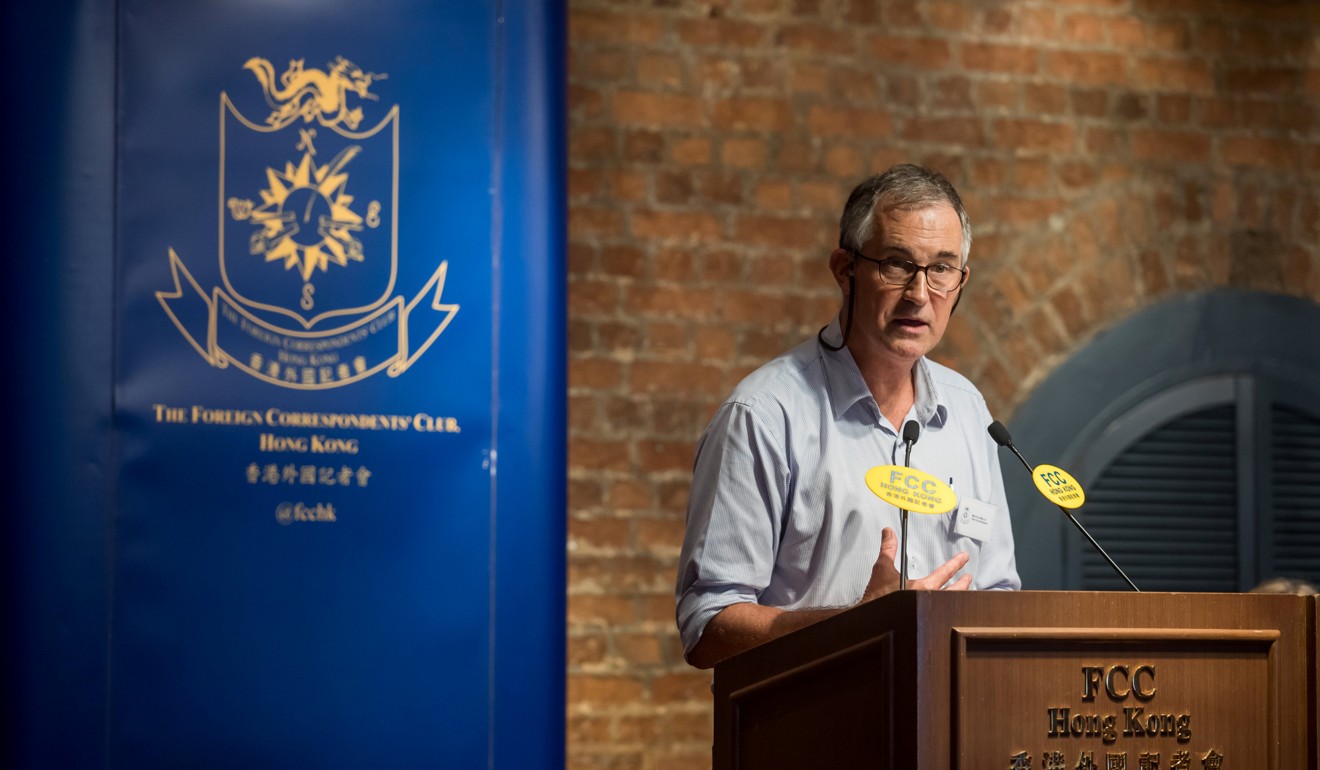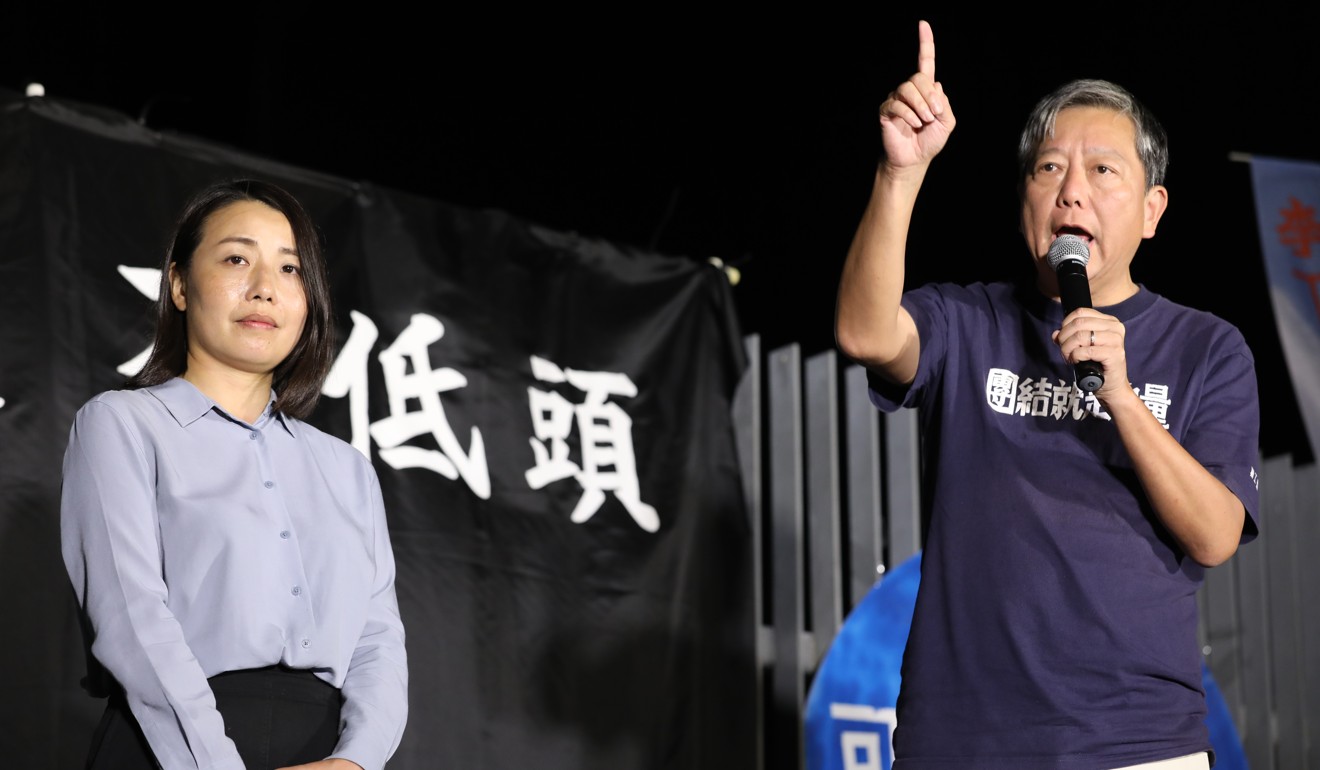
Hong Kong media should quell talk of independence, by-election hopeful Chan Hoi-yan says, insisting Victor Mallet case has nothing to do with press freedom
- Former television anchor says there is ‘insufficient evidence’ of threat to journalistic freedom
- Local media should make clear there is no room for discussion of city’s independence, she adds

Former television anchor turned election hopeful Chan Hoi-yan on Tuesday insisted the Hong Kong government’s denial of a journalist’s visa had nothing to do with press freedom, and said the media should make it clear there was no room for discussion of independence.
Despite coming under fire for similar comments made after the Victor Mallet saga erupted earlier this month, Chan, who has been endorsed by the pro-establishment bloc to contest a by-election in Kowloon West next month, was adamant there was “insufficient evidence” to suggest the incident had threatened the city’s press freedom.
While the Immigration Department has refused to explain its decision not to renew the Financial Times journalist’s work visa, the move was linked to Mallet’s chairing of a controversial talk at the Foreign Correspondents’ Club (FCC) in August featuring separatist Andy Chan Ho-tin. Mallet was the acting president of the press club at the time.
“I have been defending press freedom as a journalist for 15 years. But apart from press freedom, what I also learned from journalism was fact-finding,” Chan said during a two-hour election forum on Commercial Radio. “I would not stir up fear before sufficient evidence emerges.”

Chan said there was no sign of the city’s press freedom being in danger given how both broadcast and print media had been able to run wide coverage of the Mallet saga.
When grilled on whether media outlets could still discuss the city’s independence, Chan said they could, but with strings attached.
“I think it is fine if [the media] states after the debate that there is actually no room for such discussion,” said Chan, who served as the political assistant of former food and health minister Dr Ko Wing-man in the last Hong Kong administration.
“You have to send a very clear message instead of just promoting this [independence] idea.”
Chan’s argument was heavily criticised by Labour Party veteran and fellow by-election contender Lee Cheuk-yan, who is representing the pro-democracy camp after its original candidate, Lau Siu-lai, was barred from running on the grounds she once advocated self-determination.
Lee said it was highly disappointing that Chan, as a former journalist, would turn a blind eye to the impact of the Mallet case on press freedom because of the coming poll.
“How can you square that with your [journalistic] training and profession?” Lee asked, accusing Chan of “hiding behind the Immigration Department”.

During the forum, Lee slammed the election ban imposed on his party colleague Lau, but also made it clear he neither supported the notion of breaking away from China nor agreed that it should be listed as an option for Hongkongers.
“No one in Hong Kong would believe I am pro-independence. I have called for the end of one-party dictatorship in China, and I have hoped to change China,” said Lee, a core member of the Hong Kong Alliance in Support of Patriotic Democratic Movements of China.
He reiterated however that Hongkongers enjoyed the right to amend the Basic Law, the city’s mini-constitution.
Lee faces an uphill battle in capturing the Kowloon West seat because of infighting within the pro-democracy bloc.
The unionist will be running against fellow pan-democratic veteran Frederick Fung Kin-kee, who insisted on contesting in protest against the bloc’s decision to appoint Lee as the backup candidate instead of holding a primary.
When asked by programme hosts, Fung refused to say if his prime target in the race was Lee or Chan.
“Both of them are the same. They are both anointed and chosen through discussion, but not a primary. Both of them also effectively bar young people from running in the race,” Fung, 65, said.
Independent candidates Ng Dick-hay and Judy Tzeng Li-wen have also signed up for the polls, which will be held on November 25.
Separately, both the city’s top finance official and the Financial Times steered clear of the Mallet case at a Tuesday forum co-hosted by the newspaper and the Asian Infrastructure Investment Bank.
Mallet, who has already left Hong Kong, was originally supposed to moderate two of the sessions at the event.
Financial Secretary Paul Chan Mo-po attended the forum as acting chief executive, while the city’s leader, Carrie Lam Cheng Yuet-ngor, was officiating the opening of the Hong Kong-Zhuhai-Macau Bridge in Zhuhai.
Chan did not answer when asked by a member of the press afterwards whether he owed the event host an explanation on the Mallet case.
Financial Times Asia-Pacific managing director Angela Mackay declined to comment when approached by the Post.
“We are not commenting any further,” Mackay said. “Victor was acting in his capacity as a member of the FCC … and we support him in his appeal [against the visa denial].”